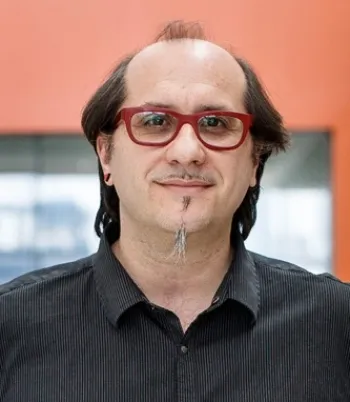Submitted on April 24, 2025

Davide Ruggero, PhD, professor of urology at UCSF and member of the Helen Diller Family Comprehensive Cancer Center, has received a rare renewal of his American Cancer Society (ACS) Professorship – one of the most prestigious and selective honors in cancer research. Reserved for visionary scientists whose work has reshaped their fields, the ACS Professorship is awarded to only a handful of researchers nationwide.
A Professorship for Trailblazers
The ACS Professorship is more than a recognition of past accomplishments – it honors research that breaks boundaries and opens new directions in cancer biology.
Dr. Ruggero has done just that by helping establish the field of translational control in cancer – an area once overlooked by many scientists. His lab focuses on what happens after genetic information is transcribed into RNA: how cancer cells selectively translate specific RNAs into proteins that drive growth, survival, and metastasis.
“Proteins are the true effectors in the cell,” he explained. “People used to think that once an RNA is made, the protein just follows by default. But we’ve shown that’s not true. Even more so than normal cells, cancer cells can hijack the process of selective translation of certain RNAs to produce the proteins they need to thrive.”
This insight led to what Dr. Ruggero calls translatome therapy, a novel approach that targets the production of cancer-driving proteins rather than the protein activity itself.
“Instead of trying to block the activity of an oncogene after it’s made, we’re going after the step before that – its production,” he said.
Dr. Ruggero's research showed that using a combination of drugs that both impact the translation of an oncogene and its activity is more effective than using a single drug. In a recent important study, his lab utilized translatome therapy by employing a drug already tested in the clinic to target the translation of the androgen receptor, a key player in prostate cancer. This approach works alongside a clinical frontline drug that blocks the activity of the androgen receptor.
Metabolism and Diet: Revealing Cancer’s Achilles’ Heel
In other recent research, Dr. Ruggero’s lab uncovered a striking link between diet and cancer therapy. They found that while a ketogenic (high-fat, low-carbohydrate) diet is appealing to cancer cells, it also exposes a hidden vulnerability to the translatome therapy.
“Cancer cells love the ketone diet… but doing so opens an Achilles’ heel,” Dr. Ruggero said.
His team demonstrated this concept in a mouse model of pancreatic cancer. Mice harboring human pancreatic cancer, when on a ketogenic diet, become addicted to the translation of specific mRNAs that encode for all the components of the ketogenic pathway. By doing so, the tumors become sensitive to a compound (already tested in the clinic) that blocks this translation control of fat metabolism. This approach showed dramatic tumor suppression.
Mentorship: Building the Future of Science
The renewal of the ACS Professorship also highlights Dr. Ruggero’s commitment to mentorship and lab culture – areas he views as central to his mission as a scientist.
From junior specialists who’ve gone on to top-tier PhD programs, to postdoctoral fellows now leading labs at top-tier universities such as UPenn, Fred Hutch, University of Colorado to the University of Istanbul, Dr. Ruggero’s mentees reflect his deep investment in scientific training and leadership. Another two postdocs will establish their labs in the US next year.
“I want to keep expanding this field, mentoring the new generation so they continue the legacy of our lab and develop this new approach to understanding the origins and treatment of cancer,” he said.
From Archaea to Oncology
Dr. Ruggero’s path to cancer research was anything but traditional. He began his career studying archaea – microorganisms that thrive in extreme environments like volcanoes and geysers. Over time, he saw parallels between these extremophiles and cancer cells.
“Cancer cells reminded me of my archaebacteria… they adapt to extreme conditions,” he said.
The idea was provocative – and met with skepticism, even among his peers. “People said, ‘We don’t understand what you are doing.’ But I stayed strong,” he recalled.
That bold, unconventional thinking continues to shape his research today.
Looking Ahead: Expanding the Field and Inspiring Innovation
As Dr. Ruggero reflects on this rare and meaningful recognition, he remains focused on the future:
- Training exceptional young scientists
- Advancing the field of translational control in cancer
- Exploring new connections between metabolism, nutrition, and cancer therapy
"My goal hasn't changed: to train the best scientists possible and continue expanding this field," he stated.
To those carving their own research paths in these days, he offers this encouragement:
"Becoming a scientist is akin to being an artist. If you have the innate passion, energy, drive, and curiosity – just keep pursuing it."